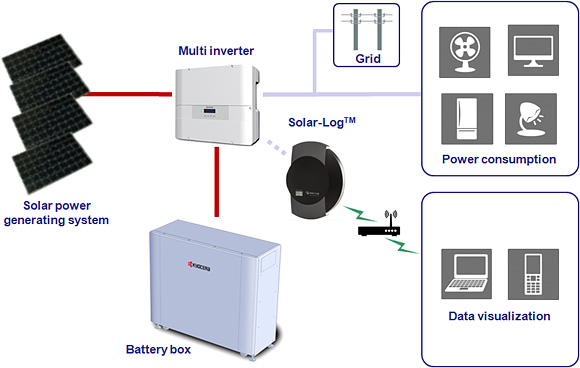
How a Solar Energy Storage System Can Lower Your Utility Bills
Solar energy storage systems are a critical piece of the renewables puzzle. They help ensure that the power generated by your solar panels is available when you need it most, including at night.
Energy storage can be co-located with a solar energy system or stand alone, depending on your needs. There are a variety of different solar battery technologies to choose from, with differing energy and power capacities.
1. Increased Energy Self-Sufficiency
A solar energy system with a battery is an effective solution for increased energy self-consumption. The batteries allow the user to draw power from them at night and during blackouts, reducing or even eliminating utility bills altogether.
When the sun shines, your photovoltaic system creates electricity which is used in your home or business under Net Metering configurations. Any unused power is sent to the grid to be shared. With a storage system, this excess energy is stored on-premise in your battery.
Batteries can be sized to meet a variety of needs, from short-term energy storage to providing backup power for days or weeks during a grid outage. Solar systems with batteries can also be combined with heat pumps and electric vehicle (EV) charging stations for increased functionality.
To achieve energy self-sufficiency, it is important to monitor your consumption habits. Energy consumption monitoring software will help you identify areas where you can reduce your usage. This can be done in a variety of ways, including installing a smart Solar energy storage system thermostat. Increasing your energy self-sufficiency will not only improve your lifestyle, but will also support the international drive towards a better climate future.
2. Reduced Dependence on the Grid
Solar + Storage systems allow users to generate power for themselves when the sun is out, but also take in energy from the grid at times that they need it most. Energy storage can help smooth electricity prices through arbitrage, manage evening energy ramps, mitigate the risk of curtailment and provide backup power.
At the consumer level, battery storage systems can save electricity for when utility demand is high, which allows you to avoid peak time-of-use (TOU) charges that can spike during summer peak demand periods. This can also be helpful for saving energy-intensive items like electric vehicle recharging for the nighttime, when electricity rates are typically lower.
Solar + Storage can also be a powerful tool for businesses that are looking to reduce their dependence on the grid. By pairing a solar energy system with an on-premises battery storage solution, a business can offset its daytime electricity consumption with on-site generation, while reducing the amount of electricity it needs to draw from the grid during the peak TOU hours. This can lead to a faster return on investment for the solar system and more savings from reduced utility bills.
3. Lower Utility Bills
While solar energy systems can be used to reduce dependence on the power grid, pairing them with battery storage provides a number of additional benefits that will help lower your utility bills.
Homeowners who install solar + storage can significantly reduce their demand charges, which are based on 15-minute increments of peak electricity usage. Utility companies calculate demand charges by tying them to your monthly energy consumption and adding them on top of the customer charge, distribution charge and standard energy charge. Peak shaving is a key practice for lowering demand charges and solar + battery energy storage is the most cost-effective way to do it. Other methods, like using diesel generators or manually turning off equipment, create pollution, make your facility inefficient and can cause downtime.
Additionally, solar battery energy storage helps to maximize the economics of net metering, which allows you to credit your utility for the excess electricity your home produces and feeds back into the grid. This can be especially important in states Solar energy storage system that offer a true “net metering” program, which is not currently available in all areas.
4. Environmentally Friendly
The combination of solar PV and battery energy storage can mitigate the intermittent nature of renewable power sources, ensuring a steady supply. Solar energy systems are already better for the environment than grid-tied electric utilities, but adding storage allows you to go even further.
Solar batteries can also help homeowners save more money in states where net metering policy reduces the value of their energy credits. They can also help reduce demand charges, which are based on the 15-minute period of highest energy consumption and can account for 50 percent or more of a commercial facility’s electricity bill.
NREL researchers are studying how solar-plus-storage systems can benefit both property owners and the electric grid, including technologies that can store power for longer durations (up to 100 hours). They’re exploring both residential and utility-scale applications for these new types of storage. And they’re supporting research to improve siting practices that minimize impacts on wildlife, habitats, and soil and water resources.
5. Reduced Carbon Footprint
Energy storage mitigates the intermittent nature of renewable power by storing and releasing electricity around the clock. This helps businesses avoid peak demand charges and enables them to reduce the amount of electricity they draw from the grid, further contributing to a reduced carbon footprint.
Whether co-located with solar PV or in standalone form, battery systems can help smooth out the variations in how energy flows through the grid caused by weather events like rainstorms, snowfall, and wildfires. It can also help solar owners avoid losing feed-in tariffs on their solar panel systems when the grid goes down during a power outage.
Although the technology can seem complex or overwhelming to some, many customers can benefit from battery energy storage because it will lead to a faster return on investment for their solar system. Aurora provides customers with easy-to-understand models of performance and savings so they can get an idea of what adding a battery energy storage system to their solar installation would look like.
